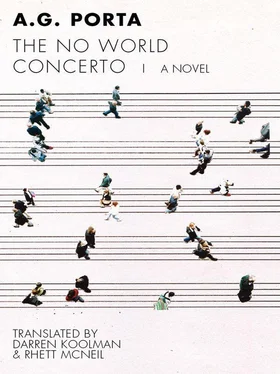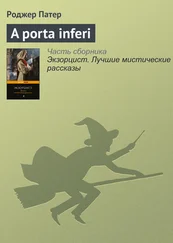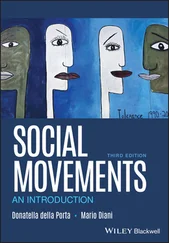That night, she enters the writer’s café in front of the church where the young conductor of the orchestra and brilliant composer are sitting at the back. They ignore her. There are no more disputes, just cold dismissals. This is a new feeling, this drifting away, as if being dragged out to sea by the current, farther and farther away from those who were once so close, who are now starting to become a memory. Perhaps their coldness is a new strategy, a part of their game. The young conductor’s latest conquest is sitting next to him. They know, the girl thinks. Her mother must’ve told them that she won’t be joining them on tour. She finds her mother sitting on a stool at the bar. You’re late, she says. You’re not going to believe it, says the girl emphatically, grinning with relish before exulting: I spent the afternoon with your cousin, Dedalus.
Her mother’s attitude softens as she hears about the details of their encounter. She says nothing during her daughter’s energetic narration, answers none of her cursory questions, just listens quietly, taking economical drags on her cigarette. The two women are sitting alone in the corner of the café. There are many people walking back and forth in the shot, but only we are privy to this one conversation. As she speaks, the girl is suddenly overcome by the same anxious feeling she gets when she hears those voices calling to her. Should she give her mother time to digest this news, to get used to the fact that it was her daughter who found him, the one who got the prize deer, so to speak, and not her? No, it must be something else. She looks straight into her mother’s eyes. You knew exactly where he was, didn’t you? In fact, I think you’ve known for years. Her mother breaks eye contact and looks elsewhere, a gesture the girl takes for assent; and although the smoke from her cigarette may be the real culprit as far as her refusal to put the matter into words, the truth seems about to transude from her mother’s pores. Perhaps they were lovers. Why else would she keep his whereabouts a secret for so many years? Are you finished? asks her mother, who insists they end the conversation. Now it’s the girl who doesn’t answer. She can’t think of anything to say that will prolong her victory. Her mother gets up from the stool, slinging her handbag over her shoulder. The screenwriter imagines a large handbag, matching a short, loose dress. You should focus on the concert, she advises the girl, before turning around and walking away.
The screenwriter is exhausted. He stands up and does a couple of laps of the room to wake himself up. Then he lights a cigarette, sits down again, and rereads the last page. He takes a hopeful look at the building opposite. Again, his neighbor’s window is dark. She must have gone out. He goes to the mini-kitchen next to the door and pours himself a glass of water. Then he sits down on the sofa and turns on the TV. It seems something quite significant has happened, because all the channels are broadcasting the same news: they’re all reporting the arrest of the most notorious terrorist in history — a man who, for twenty years perhaps, has been the world’s most wanted fugitive. It seems they captured, or maybe kidnapped him in a faraway country and then brought him to the capital. The screenwriter doesn’t understand why they went to all that trouble. Why they didn’t just assassinate him. While watching, he half-consciously considers a few synonyms for assassinate: dispatch, murder, liquidate. . no, assassinate is the best word.
She hasn’t gone to bed yet. She’s been writing in the bathroom since her father fell asleep. She doesn’t know where it’s going, but she’s writing, and that’s all that matters. Her meeting with Cousin Dedalus has again made her reconsider her story. The old philosophy professor could be replaced with the cousin. But after considering some options and writing some drafts that now are nestling in the wastebasket, she hasn’t found a plausible way to do so. There’s nothing new to write about really. All she did, in the end, was find him. She still knows as little about the man as she did before. So she still compensates for her ignorance by making things up based on the same prejudices and presumptions she already had about him. This isn’t the way to start a book about Cousin Dedalus’s life. She doesn’t want ignorance and presumption to dictate the plot of her story. It might dictate everything else too. So she decided to stick with her original choice: the old professor cum alien hunter. At least, with him, she gets all her material firsthand. She’s still describing the period immediately before his flight to the City in Outer Space, before he decides to establish himself as a photographer in some other part of the universe. “3.2 A thought can be expressed using simple signs. The professor watches the female student on the TV screen. She’s standing in the middle of an empty room wearing a school uniform. All the walls are white, and the floor is covered over with a white sheet. The old guy’s absorbed by the images on the screen. Occasionally, his voice is heard giving her instructions on how to undress, but mostly there’s only silence, the soft whisper of movement as she takes off her clothes, the delicate rustle as they fall to the floor. Slowly, he says. Slowly. . the uniform’s an old one, and therefore a little snug. She first takes off her patent leather shoes, then she removes her skirt, and after unbuttoning her shirt, she turns her back to the camera and coyly removes her bra. She teases the camera, regardant, playing with her shirt, moistening with her tongue the area of fabric covering her nipples.
Then she knots the shirt around her waist. The old professor’s voice bids her to pull the edges of her panties up. She obeys. But she does so slowly, teasingly, toying with both sides alternately, and pulling at the seams. Then the same voice bids her to pull the panties halfway down and leave them suspended between her thighs. Once again, she obeys. 3.203 Ka is the same sign as Ka. The female student’s no longer on the TV screen, but beside the old professor, dressing after having had a shower. He asks her to sit and watch the video with him. It’s late, she says. It doesn’t matter how late it is, he says without taking his eyes off the screen. Just stay. Onscreen, the girl is on her knees, again wetting the parts of her shirt covering her nipples. She raises her breasts with both hands, and the voice of the professor bids her to start masturbating. Then the same voice bids her to urinate between her fingers. It seems like an eternity passes before she manages to squeeze out a few drops. They trickle down her thighs and onto the white sheet covering the floor. As she eases into a steady stream, the camera zooms in on the growing puddle. The old professor hears the door close, and he moves his eyes momentarily away from the screen, his mouth half-open, as if intending to say something, perhaps good-bye. But now it’s too late even for good-byes, so his eyes return casually to the screen. A faint halo surrounds the female student’s body. But the old professor, the out-of-practice alien hunter, either cannot or does not want to see it. Perhaps he’s conditioned himself to see them only as they can be made to appear on his old daguerreotypes. 3.3 Only in daguerreotypes do extraterrestrials acquire true meaning. On the stairway, the female student thinks she just heard someone pronounce her name with a ‘ka.’” The girl rereads what she’s written and then types it up on the laptop. Now, whenever she writes in her father’s hotel room, whether she does it in the bathroom or wherever, she always transcribes what she’s done on his laptop. He doesn’t know about this, of course, and she doesn’t want to ask permission yet, in case he says no, because she hasn’t got a laptop of her own. The screenwriter thinks it’s a kind of fetish, this habit of typing up everything she writes, as if she’s reluctant to let go of what she’s done, to move forward and deal with what has yet to be done, to resist the temptation the relinquish the past, to resist the temptation to start all over again. The girl receives a phone call from the brilliant composer. Her father gets out of bed and stretches as he walks out onto the balcony to survey the Grand Central Station. The phone call is brief, formal — just letting her know the new rehearsal venue. She notes down the address in her diary. Then she collects her father’s laptop from the bathroom and furtively, deftly, places it back on the table. She goes outside to ensure he didn’t notice the sleight. But she needs a ruse — her encounter with cousin Dedalus. She notes the expression on his face. It’s like the expression one prepares before receiving bad news. He turns to look at her. But his eyes seem not to see her. It’s as if he’s listening but is puzzling over something else. Just a chance encounter, he says once she finishes her account. Then silence. His expression is routine, the kind that could be interpreted to mean anything. Then one of his many cell phones rings. He goes inside to answer it. She hears him answer it by giving his name. He enters the bathroom and shuts the door. She hears nothing more. McGregor speaking, says the girl, imitating the voice she supposes is on the other line. Despite her suspicions, the girl wishes she knew for sure who was calling. She wishes she could hear what they are talking about. She’s hardly a detective. A coincidence? There are no such things as coincidences, she says. There are no such things as chance encounters either.
Читать дальше












